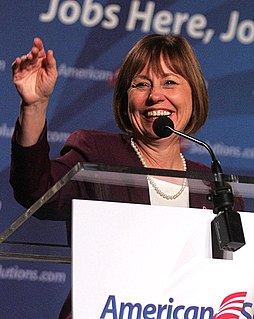A Quote by Steve Hanke
High mandated minimum wages will throw people out of work and onto the welfare rolls in cases where unemployment benefits exist. When it comes to welfare payments, they obey the laws of economics, too. Indeed, if something - like unemployment - is subsidized, more of it will be produced.
Related Quotes
In the name of compassion, Obama advocates seemingly endless extensions of unemployment benefits because his economic theology holds that by paying people not to work, you will create jobs. It not only fails to factor in the obvious deterrent that extended benefits have on their recipients but also falsely assumes that transferring money from one pocket to the next generates more spending - by some mythical multiple factor, no less. Back on planet Earth, studies reveal that extending unemployment benefits results in more unemployment.
Because tax cuts create an incentive to increase output, employment, and production, they also help balance the budget by reducing means-tested government expenditures. A faster-growing economy means lower unemployment and higher incomes, resulting in reduced unemployment benefits and other social welfare programs.
Somehow, the fact that more poor people are on welfare, receiving more generous payments, does not seem to have made this country a nice place to live - not even for the poor on welfare, whose condition seems not noticeably better than when they were poor and off welfare. Something appears to have gone wrong; a liberal and compassionate social policy has bred all sorts of unanticipated and perverse consequences.
I've heard the argument that unemployment benefits somehow act as a disincentive to the long-term unemployed when it comes to looking for work, but the opposite is true. Unemployment Insurance serves as a powerful incentive for people to keep searching for jobs, rather than drop out of the labor force altogether.
Free migration within Europe means that countries that have done a better job at reducing unemployment will predictably end up with more than their fair share of refugees. Workers in these countries bear the cost in depressed wages and higher unemployment, while employers benefit from cheaper labor.
The 1996 welfare reform law, for the first time, connected welfare benefits with an expectation that recipients would work or participate in training. That work requirement led to record increases in employment and earnings and a record decrease in poverty and welfare dependence after it was enacted.
You know, there is an argument to be made that these extensions of unemployment benefits keep people from going and finding jobs. In fact there are some studies that have been done that show people stay on unemployment compensation and they don't look for a job until two or three weeks before they know the benefits are going to run out.
If the Left really wants to preserve family structure and advance cultural values such as work, why do they oppose reforms to a welfare system that pays teenage girls to have babies out of wedlock and disparage conservative proposals that require able-bodied Americans to work for their welfare benefits like food stamps?


































